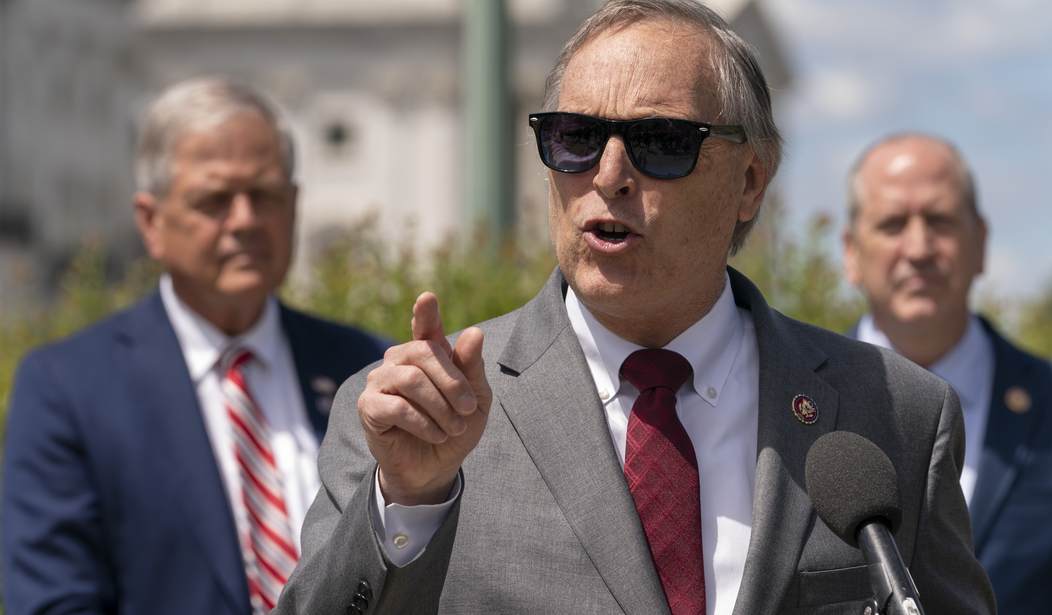The ridiculous lawsuits keep coming against Republican members of Congress to bar them from running for re-election, on the basis of claims that these members were involved in an "insurrection" at the U.S. Capitol on January 6. On Friday, however, an Arizona judge ruled against one of the latest rounds of lawsuits, this time from voting groups seeking to prevent Reps. Paul Gosar and Andy Biggs, both Republicans from Arizona, as well as State Rep. Mark Finchem, a fellow Republican from the state, from appearing on the ballot.
Maricopa County Superior Court Judge Christopher Coury ruled against the voter groups, as Ryan King reported for The Washington Examiner, based on grounds to sue. The groups bringing the suit tried to claim that the Arizona Republican lawmakers had participated in an "insurrection" on January 6, based on their presence at the rally before the rioters headed for the Capitol.
JUST IN: Maricopa Superior Court dismisses claims against @DrPaulGosar, @andybiggs4az, and @RealMarkFinchem that would have disqualified then from the AZ ballot. pic.twitter.com/YGIVJ26nOU
— The AZ - abc15 - Data Guru (@Garrtt_Archer) April 22, 2022
The lawsuit, as has been the case with such efforts against other members of Congress, attempted to use Section 3 of the 14th Amendment, written at the time to bar Confederate sympathizers from holding public office. In February, as I covered at the time, the state election commission in Indiana unanimously blocked an attempt from Democrat Aaron "AJ" Calkins to remove Rep. Jim Banks (R-IN) from the ballot over such a claim.
Judge Coury's ruling, however, in addition to referencing how "The Court expressively is not reaching the merits of the factual allegations in this case," includes a footnote stressing that point.
"To be clear, it is a mistake to conclude that the Court is opining that the Candidates' involvement in the events of January 6, 2021 never can be subject to any judicial review. This decision should not be misconstrued in this way. Indeed, there mat be a different time and type of case in which the Candidates' involvement in the events of that day appropriately can and will be adjudicated in court. However, the special, statutorily-created, limited and expedited lawsuit simply is not designed for such an adjudication," the footnote read.
Recommended
It concluded by reminding readers that the fate of Reps. Gosar and Biggs, as well as State Rep. Finchem, is up to the people of Arizona. "And, irrespective of this decision, there ultimately will be a different trial for each Candidate: one decided by Arizona voters who will have the final voice about whether each Candidate should, or should not, serve in elective office."
The Arizona Republicans tweeted their celebration of the ruling.
Boom.?????? pic.twitter.com/5PPUzx0xqq
— Mark Finchem (@RealMarkFinchem) April 22, 2022
The truth is, these groups have no evidence to support their crazy claims, but these baseless cases allow them to further their own narrative.
— Andy Biggs (@andybiggs4az) April 22, 2022
2/3
The frivolous argument used against me has been used in other states to target mainstream Republicans running for re-election. Their efforts are failing and will continue to fail.
— Rep Andy Biggs (@RepAndyBiggsAZ) April 22, 2022
This type of political harassment is unacceptable. The American people are watching this political theatre break down.
— Rep Andy Biggs (@RepAndyBiggsAZ) April 22, 2022
The case against @RepMTG will not survive appeal. Today the court in AZ dismissed the same lawsuit against me and @RepAndyBiggsAZ and @RealMarkFinchem in a meticulously detailed ruling. If they can’t win at the ballot box the leftists run to the courts. https://t.co/ph7NZjFvVB pic.twitter.com/zW6UB4FTH1
— Paul Gosar (@DrPaulGosar) April 22, 2022
Rep. Gosar has continued to tweet in support of Rep. Marjorie Taylor Greene (R-GA), who is facing her own lawsuit.
The Stop the Steal movement is still needed. Not content to steal elections the left is now set on stealing member seats that it can’t take in a fair fight at the ballot box or by ballot fraud. https://t.co/qtyYklIQAi
— Paul Gosar (@DrPaulGosar) April 23, 2022
The leftists are constantly attacking our freedoms. Stay strong @RepMTG https://t.co/2pXz6CcaC8
— Paul Gosar (@DrPaulGosar) April 23, 2022
About as undemocratic as it gets. https://t.co/3m64AhwrzF
— Paul Gosar (@DrPaulGosar) April 23, 2022
Judge Coury's ruling also referenced the Cawthorn case, against Rep. Madison Cawthorn (R-NC). As I covered last month, U.S. District Judge Richard E. Myers II blocked an effort from voting groups to block the congressman from the ballot, as they claimed Cawthorne was an "insurrectionist." Judge Myers agreed with Cawthorn's attorney, James Bopp Jr. that the lesser-known section was rendered moot by subsequent legislation, in the Amnesty Act of 1872
Since then, as the Associated Press reported, Judge Myers has also denied the request of voters from North Carolina's 11th district from participating in litigation filed by Cawthorn against the State Board of Elections.

























Join the conversation as a VIP Member